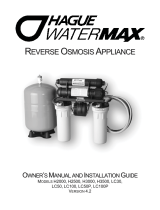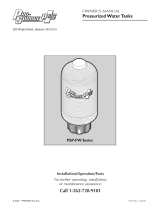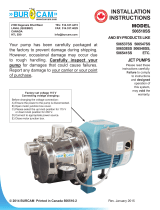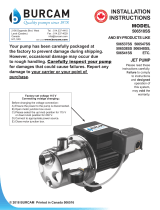Page is loading ...

U80-129 (5/10/06)
Hazardous voltage, Disconnect power before
working on the motor or the pressure switch.
The starting and stopping of the pump is controlled by the
pressure switch.
The pressure switch is typically pre-set correctly for the
application. If the cut-off or cut-on pressure needs to be
changed, follow the procedure below.
These instructions cover one-post and two-post switches.
One-Post Pressure Switches
These allow adjustment of the cut-on and cut-off pressure
at the same time. This will keep a 20 PSI differential
between the start (cut-on) and stop (cut-off) pressures.
To increase the cut-off and cut-on pressure, turn the nut
clockwise . The rate of increase is 2 1/2 PSI for every
complete turn of the nut.
(i.e. 4 complete clockwise turns will raise the pressure
setting 10 PSI.)
Two-Post Pressure Switches
Pressure switches with two posts allow adjustment of the cut-
on and cut-off pressure at the same time. The second post
allows adjustment of the cut-off pressure independently.
To increase the cut-off and cut-on pressure, turn nut #1
clockwise . The rate of increase is 2 1/2 PSI for every
complete turn of the nut. Do not adjust nut #2
The above adjustments maintain a 20 PSI differential
between cut-on and cut-off pressures, which is best for
pressure tank performance. Very few applications will need
to adjust nut #2.
To raise only the cut-off pressure , turn nut #2 clockwise.
To lower any pressure, turn the nut counter-clockwise
.
NOTICE: The switch should never be adjusted to cut-on
below 20 PSI, or cut-off above 60 PSI.
System Pressure
The pressures in a well pump system must keep a set
relationship.
• Dead-head pressure: This is the pressure the pump
produces when not moving water, as with a closed
outlet valve.
Risk of explosion. Do not run the pump
with a closed discharge longer than needed to read the
pressure.
• Cut-Off Pressure: This is the high pressure that turns off
the pump. This should always be at least 5 PSI less than
the dead-head pressure.
• Cut-On Pressure: This is the low pressure that starts the
pump. This is typically 20 PSI less than the cut-off
pressure.
• Tank Precharge Pressure: This is set 2 PSI less than the
cut-on pressure (see chart).
*With NO water pressure
Adjusting Well Pump Pressure Switches
Loosen to Remove
Pressure Switch Cover
Figure 1: Pressure Switch Location
Figure 2: Single Post Pressure Switch
Figure 3: Two Post Pressure Switch
Switch Cut-On Pressure Tank Air Precharge*
20 18
30 28
40 38
/



